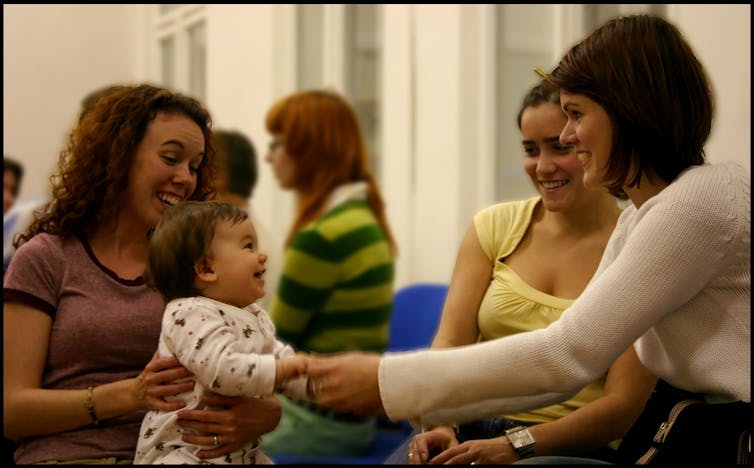How Do U Know When a Baby Is Full
Whatever adult who has attempted to learn a foreign language tin can adjure to how difficult and confusing it can be. So when a three-year-old growing upward in a bilingual household inserts Spanish words into his English sentences, conventional wisdom assumes that he is confusing the two languages.
Research shows that this is non the case.
In fact, early childhood is the best possible time to learn a second language. Children who experience two languages from birth typically become native speakers of both, while adults often struggle with 2d language learning and rarely attain native-like fluency.
Only the question remains: is it disruptive for babies to acquire two languages simultaneously?
When practise babies learn language?
Research shows babies begin to learn linguistic communication sounds earlier they're even born. In the womb, a female parent'south voice is one of the nearly prominent sounds an unborn baby hears. By the time they're built-in, newborns tin can not simply tell the difference between their mother's language and some other language, but besides show a capability of distinguishing betwixt languages.
Linguistic communication learning depends on the processing of sounds. All the world's languages put together contain about 800 or so sounds. Each linguistic communication uses only virtually twoscore language sounds, or "phonemes," which distinguish ane language from another.
At nascence, the baby encephalon has an unusual gift: it can tell the difference between all 800 sounds. This means that at this phase infants tin larn any language that they're exposed to. Gradually babies figure out which sounds they are hearing the about.

Betwixt six and 12 months, infants who grow up in monolingual households go more specialized in the subset of sounds in their native language. In other words, they become "native language specialists." And, by their first birthdays, monolingual infants begin to lose their ability to hear the differences betwixt foreign linguistic communication sounds.
Studying baby brains
What nearly those babies who hear two languages from nascency? Tin can a babe brain specialize in two languages? If and then, how is this process different then specializing in a single language?
Knowing how the baby encephalon learns one versus two languages is important for agreement the developmental milestones in learning to speak. For example, parents of bilingual children often wonder what is and isn't typical or expected, or how their child will differ from those children who are learning a unmarried language.
My collaborators and I recently studied the brain processing of language sounds in 11-month-old babies from monolingual (English just) and bilingual (Spanish-English) homes. We used a completely noninvasive technology called magnetoencephalography (MEG), which precisely pinpointed the timing and the location of activity in the brain every bit the babies listened to Castilian and English syllables.
We found some key differences between infants raised in monolingual versus bilingual homes.
At eleven months of age, merely before nigh babies brainstorm to say their first words, the brain recordings revealed that:
-
Babies from monolingual English households are specialized to procedure the sounds of English language, and non the sounds of Castilian, an unfamiliar linguistic communication
-
Babies from bilingual Spanish-English households are specialized to procedure the sounds of both languages, Spanish and English language.
Our findings show that babies' brains get tuned to whatever linguistic communication or languages they hear from their caregivers. A monolingual encephalon becomes tuned to the sounds of one language, and a bilingual brain becomes tuned to the sounds of ii languages. By eleven months of historic period, the activity in the baby brain reflects the language or languages that they have been exposed to.
Is it OK to learn two languages?
This has important implications. Parents of monolingual and bilingual children alike are eager for their little ones to utter the first words. Information technology'southward an exciting time to learn more about what the baby is thinking. However, a mutual business concern, especially for bilingual parents, is that their kid is not learning fast plenty.
We found that the bilingual babies showed an equally strong brain response to English language sounds equally the monolingual babies. This suggests that bilingual babies were learning English language at the same rate every bit the monolingual babies.
Parents of bilingual children also worry that their children will non know as many words as children who are raised with ane language.

To some extent, this concern is valid. Bilingual infants divide their time betwixt two languages, and thus, on average, hear fewer words in each. However, studies consistently show that bilingual children do not lag behind when both languages are considered.
Vocabulary sizes of bilingual children, when combined beyond both languages, have been institute to be equal to or greater than those of monolingual children.
Some other mutual business organization is that bilingualism causes confusion. Office of this concern arises due to "code switching," a speaking beliefs in which bilinguals combine both languages.
For example, my four-yr-old son, who speaks English, Castilian, and Slovene, goes as far every bit using the Slovene endings on Spanish and English words. Research shows bilingual children code-switch because bilingual adults around them do too. Code-switching in bilingual adults and children is rule-governed, non haphazard.
Unlike monolingual children, bilingual children have another language from which they can hands infringe if they can't quickly retrieve the appropriate word in ane language. Fifty-fifty two-year-olds modulate their language to lucifer the linguistic communication used past their interlocutor.
Researchers have shown lawmaking switching to be part of a bilingual child'due south normal language development. And it could even be the outset of what gives them the actress cognitive prowess known every bit the "bilingual advantage."
Bilingual kids are at an advantage
The good news is young children all around the world tin and do larn ii languages simultaneously. In fact, in many parts of the world, being bilingual is the norm rather than an exception.
It is now understood that the abiding need to shift attention between languages leads to several cognitive advantages. Research has establish that bilingual adults and children bear witness an improved executive functioning of the brain – that is, they are able to shift attention, switch between tasks and solve issues more easily. Bilinguals accept also been institute to have increased metalinguistic skills (the power to recall about language per se, and sympathise how it works). At that place is evidence that being bilingual makes the learning of a 3rd language easier. Farther, the accumulating result of dual language experience is thought to translate into protective effects against cognitive decline with aging and the onset of Alzheimer's disease.
So, if you want your child to know more than ane language, information technology's all-time to beginning at an early historic period, before she even starts speaking her start linguistic communication. It won't confuse your child, and information technology could even requite her a boost in other forms of cognition.
Source: https://theconversation.com/why-the-baby-brain-can-learn-two-languages-at-the-same-time-57470
0 Response to "How Do U Know When a Baby Is Full"
Post a Comment